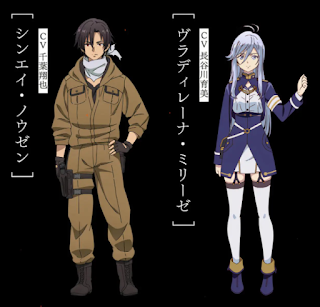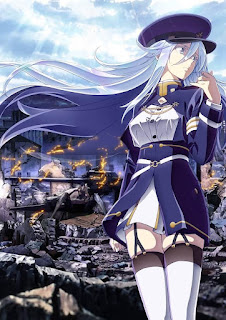Quick math quiz: what do you get when you add bushido, fatalism, racial discrimination, spiritualism, fratricide, ethnic cleansing, bystander apathy, and self-deception on a national scale to an anime mecha series? The correct total is 86.
Based on the light novel series 86 -Eighty Six- by Asato Asato, season one of 86 covers the events of the first three volumes of the novel series. The first eleven weekly episodes aired on Japanese television from April through June of last year. The series restarted in October, and the final episode aired on March 19. Season two is in production as of this writing.
The Republic of San Magnolia, home to the pale, silver-haired Alba people, found itself at war with the Empire of Giad, which deployed a force of autonomous robots known as The Legion. The Legion turned out to be uncontrollable and (it is believed) destroyed its masters, but continues fighting the Republic in obedience to its programming.
Not to worry, though, according to the government's Official Narrative, the situation is completely under control. San Magnolia's population is protected by a fortified perimeter, defended by the republic's own army of autonomous M4A1 "Juggernaut" drones. The government knows for a fact that the Legion will shut down in two years when its software life-expires, and until then the drones, whose "handlers" direct them by remote control, will keep the Legion away. Inside the perimeter, the San Magnolians live a nearly-peacetime existence, reliance on artificial foods being the only real "hardship."
When war broke out, the Alba-dominated government declared its non-Alba ethnic minorities – derisively referred to as "coloreds" – a threat to national security, stripped them of their civil rights, and moved them to concentration camps in "District 86," outside the fortified perimeter. This included the non-Alba spouses of Albans, and their biracial children – the latter of whom often ended up being hated by both camps. The Republic's Alba citizenry largely accepted this as an unfortunate necessity which conveniently coincided with their traditional prejudices.
What the public doesn't know is that the "drones" aren't autonomous robots at all; they are piloted by human "processors," young "Eighty-Six" who have been promised a restoration of civil rights if they serve a period of five years in the drone corps. Because the processors are considered something less than human, the handlers have no qualms about treating them as expendable. Casualties are high, and most processors are killed in their first year.
Army major Vladilena "Lena" Milizé, one of the handlers, is disgusted by the dishonesty of the Official Narrative and the continuing mistreatment of the Eighty-Six, and she is not shy about expressing this. While she's shunned and criticized by many of the other Alba for her "radical" views, she's tolerated in the military because she's a member of the upper class, the daughter of a war hero and niece of the commanding general, and the most effective handler they have. People who know her personally, including her closest friend, agree privately that, well, the Republic does have its dark side and yeah, the Eighty-Six did get a raw deal, but there's nothing anyone can really do about it now and there's no sense fighting the system 'cause you'll just make yourself miserable.
 |
| Shin and Lena |
In the first episode, Lena is assigned as handler for "Spearhead Squadron," an elite unit of veteran processors led by Shinei "Shin" Nouzen, a fatalist whose radio call sign is "Undertaker." Lena is the sixth handler in the squadron's history, four of the previous five having requested transfer or retirement, while the fifth "went crazy and blew his own head off with a shotgun."
Shin and his squadron-mates have no love (or even respect) for their "white pig" Alba handlers, and are initially hostile to Lena's well-intentioned but clumsy efforts to build a relationship with them. But while they don't care much for Lena or the Republic they are defending, they are a formidable fighting force, in part due to Shin's almost psychic ability to predict what the Legion is going to do, and because their own sense of honor won't allow them to give up even in the face of overwhelming odds.
As casualties among the Spearhead increase and her relationship with them becomes deeper, Lena is frustrated by the high command's puzzling refusal to provide Spearhead with reinforcements, repair parts, artillery support, or even accurate maps. The reason behind that refusal is bad enough, but the situation proves to be even worse once Lena realizes that the Legion really isn't going to shut down in two years, and is in fact getting stronger and deadlier every day.
From this initial setup, the story takes a number of unexpected twists and turns (which I will not spoil) and deals with some weighty themes along the way: How do you see people as individuals and learn to respect those you've been taught to categorically hate? What do you do when the Official Narrative is a delusion, but nobody wants to hear the truth? Is there honor in fighting for a hopeless cause, on behalf of a nation that despises you? If all you've ever known is war, can you ever lead a normal life? And over all that, of course, hangs the biggest question of all: what, if anything, can be done to stop the Legion?
86 is a serious drama, with realistic characters from believable societies facing tense situations where there are no good options and decisions can have painful consequences. The Juggernauts and similar vehicles are much more plausible and practical than the usual giant anthropomorphic robots gripping giant rifles and swords in their giant hands that you see in most mecha stories. I'm not much of a fan of anime in general, but by the middle of the second episode, I was fully invested in the fate of Shin and his comrades.
Quotes
"Stop putting the number of fatalities in your reports. Officially, there are no humans on the battlefield, so there are no fatalities."
"You didn't even bother to learn our real names!"
"I was the last one left back then, and that’s how it’s always been till now. That’s why I have to take them with me. I’ll take everyone who fought and died alongside me to my final destination."
Other notes from the after-action report
Like every other anime I've ever watched, 86 throws a kawaii comic relief character – two, actually – right into the middle of its otherwise grim war drama. I think it's a requirement written into the Japanese constitution.
There's also a rather distracting amount of fanservice in the form of Lena's dress uniform: the racy and impractical micro-miniskirt and garters are more suited for a strip club than a military parade ground.
There's an obvious parallel between the San Magnolia Republic's ethnic cleansing depicted in 86 and the Holocaust, but that's not the only real-world event it resembles. History is full of these atrocities. The Republic's flag bears no small resemblance to the flag of the 1932-45 Manchuko (Manchurian) puppet state (itself derived from the "Five-Color Flag" of the early Chinese Republic), which suggests to me that Asato Asato was thinking of Imperial Japan's conquest and colonization of Manchuria as much as anything.
The Eighty-Six's code of personal honor resembles bushido, the Japanese concept of chivalry which, in World War 2, was twisted into an ideology of fanatical militarism that inspired the "special attack units" known as the kamikaze. When, at one point, a unit of Eighty-Six is sent on a "special reconnaissance mission," every one of the characters knows that "special" means they aren't supposed to come back.
I noticed two other subtle references to World War 2. The Juggernauts are armed with high-velocity 57mm cannons, the same caliber as the British "Quick-Firing 6-pounder" antitank weapon. Another model of vehicle packs an 88mm gun, the main armament of the fearsome German Tiger tank.
Nearly all the military equipment we see travels on mechanical legs. Hasn't anyone in this fictional universe ever heard of tank treads?
 |
| Juggernaut |
Conclusion
86 is a cut above the usual battle-suit slugfest. It takes war seriously, puts a lot of thought into its world-building, and deals with serious subjects in a serious manner while avoiding, or at least toning down, most of the cheesier anime tropes. I'm glad my son Alex convinced me to watch it, and I'm looking forward to season two.
Three and a half out of four Juggernauts.
---
Baby M is not an otaku, unless being a train nerd counts.






No comments:
Post a Comment
We love comments! Just note that we always moderate because of spam and trolls. It's never too late to comment on an old show, but please don’t spoil future episodes for newbies.